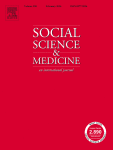Socioeconomic inequality in health in the British household panel: Tests of the social causation, health selection and the indirect selection hypothesis using dynamic fixed effects panel models
 Despite social inequality in health being well documented, it is still debated which causal mechanism best explains the negative association between socioeconomic position (SEP) and health. This paper is concerned with testing the explanatory power of three widely proposed causal explanations for social inequality in health in adulthood: the social causation hypothesis (SEP determines health), the health selection hypothesis (health determines SEP) and the indirect selection hypothesis (no causal relationship). We employ dynamic data of respondents aged 30 to 60 from the last nine waves of the British Household Panel Survey. Household income and location on the Cambridge Scale is included as measures of different dimensions of SEP and health is measured as a latent factor score. The causal hypotheses are tested using a time-based Granger approach by estimating dynamic fixed effects panel regression models following the method suggested by Anderson and Hsiao. We propose using this method to estimate the associations over time since it allows one to control for all unobserved time-invariant factors and hence lower the chances of biased estimates due to unobserved heterogeneity. The results showed no proof of the social causation hypothesis over a one to five year period and limited support for the health selection hypothesis was seen only for men in relation to HH income. These findings were robust in multiple sensitivity analysis. We conclude that the indirect selection hypothesis may be the most important in explaining social inequality in health in adulthood, indicating that the well-known cross-sectional correlations between health and SEP in adulthood seem not to be driven by a causal relationship, but instead by dynamics and influences in place before the respondents turn 30 years old that affect both their health and SEP onwards. The conclusion is limited in that we do not consider the effect of specific diseases and causal relationships in adulthood may be present over a longer timespan than 5 years.
Despite social inequality in health being well documented, it is still debated which causal mechanism best explains the negative association between socioeconomic position (SEP) and health. This paper is concerned with testing the explanatory power of three widely proposed causal explanations for social inequality in health in adulthood: the social causation hypothesis (SEP determines health), the health selection hypothesis (health determines SEP) and the indirect selection hypothesis (no causal relationship). We employ dynamic data of respondents aged 30 to 60 from the last nine waves of the British Household Panel Survey. Household income and location on the Cambridge Scale is included as measures of different dimensions of SEP and health is measured as a latent factor score. The causal hypotheses are tested using a time-based Granger approach by estimating dynamic fixed effects panel regression models following the method suggested by Anderson and Hsiao. We propose using this method to estimate the associations over time since it allows one to control for all unobserved time-invariant factors and hence lower the chances of biased estimates due to unobserved heterogeneity. The results showed no proof of the social causation hypothesis over a one to five year period and limited support for the health selection hypothesis was seen only for men in relation to HH income. These findings were robust in multiple sensitivity analysis. We conclude that the indirect selection hypothesis may be the most important in explaining social inequality in health in adulthood, indicating that the well-known cross-sectional correlations between health and SEP in adulthood seem not to be driven by a causal relationship, but instead by dynamics and influences in place before the respondents turn 30 years old that affect both their health and SEP onwards. The conclusion is limited in that we do not consider the effect of specific diseases and causal relationships in adulthood may be present over a longer timespan than 5 years.
Anders Holm & Else Foverskov: "Socioeconomic inequality in health in the British household panel: Tests of the social causation, health selection and the indirect selection hypothesis using dynamic fixed effects panel models"; Social Science and Medicine vol 150, Feb 2016
